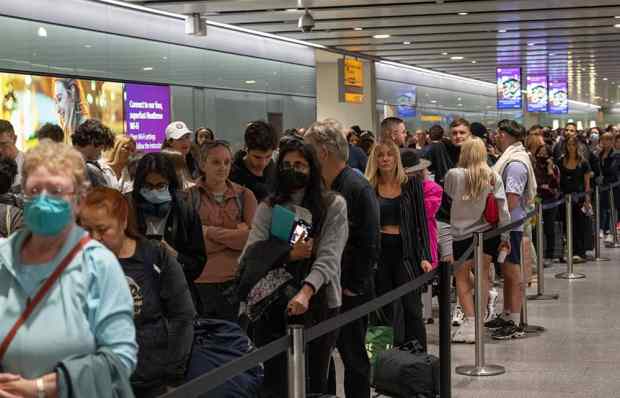It has become received wisdom that Brexit has condemned Britain to chronic labour shortages. Many of the migrant workers who used to staff our hotels and restaurants, install our bathrooms and look after our children, returned home during lockdown and never returned. Sometimes that is blamed on the end of free movement, other times more generally on Brexit Britain somehow having become less attractive in the global competition for people.
It is a notion which is easily disproved, however, by a simple figure published this week by the Office for National Statistics which went woefully under-reported. There has been no drop in migrant workers in Britain. On the contrary, there were 6.3 million foreign-born workers at the last count – a record high. This amounts to an extraordinary 19 per cent of all workers – higher even than the United States. We don’t hear much debate about these numbers. Perhaps that’s because, since Brexit, immigration has become less controversial – as one would expect with the system now being under democratic control.
It is true that the number of EU-born workers in Britain has fallen slightly, from 2.44 million to 2.39 million. But this has been more than offset by the rise in foreign workers from outside the EU. This figure has risen from 3.37 million to 3.86 million. Indians, Nigerians and South Africans are now among the biggest groups of incomers.
This was one outcome which the Brexit project hoped for: that Britain would stop being so skewed towards European migrants and become more open to those from the rest of the world. That was the benefit of being able to set our own migration policy: we could tailor it to suit the needs of the UK economy instead of being obliged to enact rules made elsewhere. Post-Brexit, entry requirements were lowered for non-Europeans and we now welcome as many migrants as at any point in our history.
Contrary to myth, Brexit was not about hostility to immigrants. Its supporters wanted to continue globalisation, but in a fairer and more sensible way. They wanted more border control to cope with the large demographic shifts across the world. It’s no coincidence that since the EU referendum, Britain is now almost alone in Europe in having no populist party in parliament or with any serious support in the opinion polls.
However, the fact remains that there are huge labour shortages. Why does the number of vacancies stand at a near record high? The mystery can be explained by another under-reported figure released this week. While there may be just 1.5 million officially unemployed, there are 5.3 million on out-of-work benefits – sickness, incapacity and so on. That amounts to on average 13 per cent of the working-age population, and closer to a quarter in Hartlepool, Middlesbrough and Blackpool. Nearly a fifth of the population are on out-of-work benefits in Birmingham, Glasgow, Liverpool and Hull.
A record number of adults were helped into the workforce before furlough. But during lockdown, those reforms stopped. A system designed to reduce poverty by helping people into work – and to assess them according to what work they could do – was replaced by old-fashioned benefit handouts. Studies show that the longer people go without work, the harder it is for them to rejoin the world of employment – and furlough proved that point. As the pandemic subsided, extra effort should have gone into providing job coaching and other support. Instead, that provision dropped. Now, those on Universal Credit can avoid having a weekly meeting with a job adviser by taking on just nine hours of work a week. Given the sheer number of job vacancies in Britain, the requirement should be raised to (at least) 20 hours.
The fact that 5.3 million are being kept on out-of-work benefits ought to be one of the most discussed aspects of British public life. But this scandalous number is not published by the government: it can be found only by diving deep into the official DWP database and even then it comes with a six-month lag. The figure is published regularly on The Spectator’s data hub, but nowhere else. Such is the lack of attention paid by the Tories to the welfare reform project that was the defining mission of David Cameron’s coalition.
There is still time to fix the labour market. The worsening economic downturn in Britain and America has some anomalies: by most people’s definition the United States is in recession, yet its recent jobs figures were incredibly strong. Britain, too, is probably in a recession, but it currently looks like a shallow one and at present there is plenty of work available for anyone who wants it. Inflation is now officially over 10 per cent – with predictions that it may hit 13 per cent in October. But there are signs that it may then fall quite quickly.
That means now is the time for bold economic reform. For as long as the official number of job vacancies stands at almost twice the average of the last decade, there is no excuse for the Tories not to help people back into work.
It may not be possible to avoid recession, but a severe one could still be prevented. All it would take is a dedicated government that does not try to fool itself, or anyone else, about the size of the task ahead.
Got something to add? Join the discussion and comment below.
Get 10 issues for just $10
Subscribe to The Spectator Australia today for the next 10 magazine issues, plus full online access, for just $10.
You might disagree with half of it, but you’ll enjoy reading all of it. Try your first month for free, then just $2 a week for the remainder of your first year.














Comments
Don't miss out
Join the conversation with other Spectator Australia readers. Subscribe to leave a comment.
SUBSCRIBEAlready a subscriber? Log in